
 |
Web search analysis |
We have accumulated enough records in the last few years to do a simple analysis of these results. After removing our test records and a few other spurious lines, the search log has 222 records. For simplicity, where a single user did multiple searches, these are analysed as independent records.
 |
Operating system used: This plot and the next one indicate that Microsoft has been allowed to take over the "advanced" world. Us Mac users can only look on in wonder as you all complain about how many millions of dollars the latest virus or worm has cost industry (mind you the figures look a bit rubbery, since they depend on input from IT departments and accountants), and how much was really spent on the "millenium bug", and wonder why no one seems to blame Microsoft, let alone punish them by buying someone else's software. | 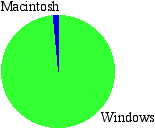 |
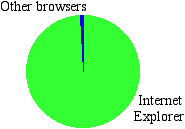 |
Browser used: See rant above, although we are aware that a number of browsers can be configured to report themselves as Internet Explorer. We suspect that almost all PC users just use the browser (IE) which came with their machine, and do not make an active choice. As web developers we have all the major browsers on Macs and PCs, and try to test our pages on all of them to make sure that the "browsing experience" is satisfactory for as many people as possible. Our "default" browser is Safari, which comes pre-loaded with Macs running OSX. Despite only being version 1.0, it is relatively stable and handles standards-compliant pages very well. In addition it has several useful features for the professional - for example "empty the cache" is directly available as a menu item and the browser opens an 'activity' window which shows all the files requested and allows individual frames, pictures, etc. to be easily loaded in a new window. Firefox is also very useful, mostly because of the numerous plug-ins which it supports, especially HTML code validation and broken link checking. |
10 years later
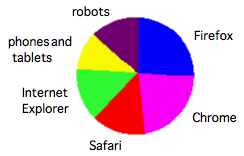 The world has changed in the decade since we first analysed our search log. During that time Firefox and Chrome are used in around half of the searches, in equal numbers. Safari and Internet Explorer have equal numbers, together making up another 25%. The rest are robots and phones. So IE eventually paid the price for Microsoft's disinterest in standards and reliance on the market dominance of Windows.
The world has changed in the decade since we first analysed our search log. During that time Firefox and Chrome are used in around half of the searches, in equal numbers. Safari and Internet Explorer have equal numbers, together making up another 25%. The rest are robots and phones. So IE eventually paid the price for Microsoft's disinterest in standards and reliance on the market dominance of Windows.
As for our usage, we have added Chrome to our list of browsers but no longer use Internet Explorer. We feel that Safari, apart from keeping up with standards changes, has not improved in ways that are useful to us, so we get by with several rather old versions.
 |
User Domain: Since we are Australian, no great surprise here - just under half the searches were from Australian domains. Given that a few Australian surfers will have a .com domain, the real Australian/international split is probably very close to 50/50 | 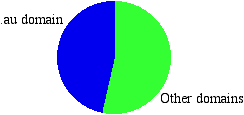 |
 |
 |
 |
Search source: If a search is carried out from the main page, it looks at the entire site, but there are also options to search just the major sections of the site. The food pages are probably the most visited, and it is clear that many more searches are initiated from within these pages. Just to show that we care, after we saw that someone had unsuccessfully looked for 'conversions', we created a cooking units conversion page. The travel pages are also well "patronised" but they provoke less searching. |  |
| Search string entered: There are always a few people who will push any button they find on a web page (or anywhere else). In fact very few did this on our pages as can be seen by the small 'empty' slice. But the truly amazing finding is the number of people looking for ways to cook crayfish (including a couple who obviously tried but could not spell the word, or maybe just could not type it). No other search string came close to the number of 'crayfish' searches. Sadly, we have no crayfish recipes, but obviously we will have to try to find some to satisfy this huge unmet demand. There were no searches for 'sex' - reputedly the commonest search string in major search engines - but if anyone tries it they will probably not get a lot of satisfaction from our pages. Strange food searches included 'hedgehog' and 'nikkujaga' - hopefully the former does not refer to the little flea-ridden spiky animal, and a Google search of the net returned no matches for 'nikkujaga' - is there such a thing? | 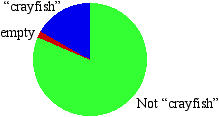 |
|
10 years later (2023)
The big change in this period has been the number of blank search strings. Some of these are robots of various sorts which just "push every button" on the page since they know no better, but many appear to be real people who act like robots and do the same. Some might be naughty people trying to break into the server by entering malicious code; we detect and remove this sort of input. There is no general pattern to the remaining searches but 'crayfish' is no longer a favoured search item. |
 |
 |
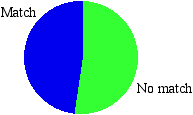 |
Success rate: Around half the searches failed to find any pages containing the search string. While this was often because no such page existed, on many searches it was clear that a bit of spelling and/or typing accuracy, or a more foccussed search approach, might have produced a better result. For example, some strings entered included 'loquate', 'SAHARA DESERT' (from the food page), 'shakespeares steak pie', 'japanes food', 'am in Ghana ,want any nearest mexican embassy', 'dessurts', 'Caryfish' and 'calafornian'. |